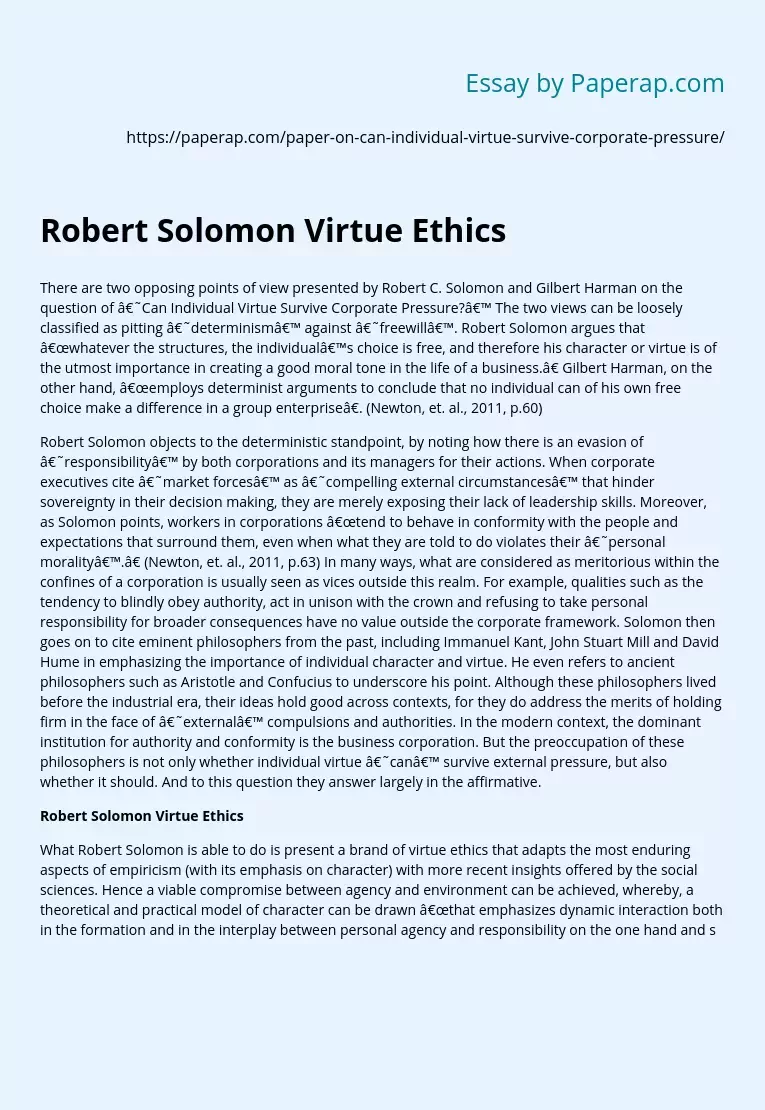Robert Solomon Virtue Ethics
The following sample essay talks about Robert Solomon’s virtue ethics. To read the introduction, body, and conclusion of the essay, scroll down.
There are two opposing points of view presented by Robert C. Solomon and Gilbert Harman on the question of ‘Can Individual Virtue Survive Corporate Pressure?’ The two views can be loosely classified as pitting ‘determinism’ against ‘freewill’. Robert Solomon argues that “whatever the structures, the individual’s choice is free, and therefore his character or virtue is of the utmost importance in creating a good moral tone in the life of a business.
” Gilbert Harman, on the other hand, “employs determinist arguments to conclude that no individual can of his own free choice make a difference in a group enterprise”. (Newton, et. al., 2011, p.60)
Robert Solomon objects to the deterministic standpoint, by noting how there is an evasion of ‘responsibility’ by both corporations and its managers for their actions. When corporate executives cite ‘market forces’ as ‘compelling external circumstances’ that hinder sovereignty in their decision making, they are merely exposing their lack of leadership skills.
Moreover, as Solomon points, workers in corporations “tend to behave in conformity with the people and expectations that surround them, even when what they are told to do violates their ‘personal morality’.” (Newton, et. al., 2011, p.63) In many ways, what are considered as meritorious within the confines of a corporation is usually seen as vices outside this realm. For example, qualities such as the tendency to blindly obey authority, act in unison with the crown and refusing to take personal responsibility for broader consequences have no value outside the corporate framework.
Solomon then goes on to cite eminent philosophers from the past, including Immanuel Kant, John Stuart Mill and David Hume in emphasizing the importance of individual character and virtue. He even refers to ancient philosophers such as Aristotle and Confucius to underscore his point. Although these philosophers lived before the industrial era, their ideas hold good across contexts, for they do address the merits of holding firm in the face of ‘external’ compulsions and authorities. In the modern context, the dominant institution for authority and conformity is the business corporation. But the preoccupation of these philosophers is not only whether individual virtue ‘can’ survive external pressure, but also whether it should. And to this question they answer largely in the affirmative.
Robert Solomon Virtue Ethics
What Robert Solomon is able to do is present a brand of virtue ethics that adapts the most enduring aspects of empiricism (with its emphasis on character) with more recent insights offered by the social sciences. Hence a viable compromise between agency and environment can be achieved, whereby, a theoretical and practical model of character can be drawn “that emphasizes dynamic interaction both in the formation and in the interplay between personal agency and responsibility on the one hand and social pressures and the environment on the other”. (Newton, et. al., 2011, p.63)
Gilbert Harman essays a thorough rebuttal to Robert Solomon’s thesis. Harman’s major objections are toward Solomon’s underestimation of the empirical threat to virtue ethics, and “his a priori claim that empirical research cannot overturn our ordinary moral psychology is overstated”. (Newton, et. al., 2011, p.77) Harman also notes an attribution error in Solomon’s argument, in that, the latter overplays seemingly obvious differences in character traits between people. Harman also questions the adaptability and relevance of the Milgram, Darley and Batson experiments, upon whose results Solomon constructs most of his analysis. As Harman succinctly concludes his essay, “Aristotelian style virtue ethics shares with folk psychology a commitment to broad-based character traits of a sort that people simply do not have. This does not threaten free will and moral responsibility, but it does mean that it is a mistake to base business ethics on that sort of virtue ethics.” (Newton, et. al., 2011, p.83) Despite this pessimism with the existing corporate structures, Harman ends on an optimistic note by allowing for the possibility of a model of virtue ethics in which virtuous behavior is socially supported and sustained.
Having scrutinized the presentation of both the authors, I am inclined to agree with Gilbert Harman when compared to Robert Solomon. It is difficult to imagine how individuals can assert their personal moral values and virtues in a corporate environment that has a distinctly limited vision and goal – mostly economic. The term ‘economic’ is the key here, for it is the most compelling reason why the discourse of personal virtue ethics is not compatible with business goals. Business corporations are economic institutions, whose major purpose is to garner short-term profit. It celebrates the principle of ‘Greed is good’ with no hint of embarrassment. In this milieu, a worker will have to leave out his individual framework of morality when he enters the premises of a corporation.
Even the sense in which business corporations view human beings – resources and commodities fetched from the labor market – makes it highly incongruent with morality in the conventional sense. The ‘market’ is much hailed by the political system and is promoted as a mechanism through which industrial production is increased and quality of our lives enhanced. But it also corrupts an individual’s character due to a reward system that works by way of benefiting those who ‘beat the system’. This was alluded to by Karl Marx when he talked about the commoditization of labor. Marx had “insight into this process. In an era in which the market is virtually deified, we need to understand how insidiously it eats away at our humanity and transforms us into caricatures of human beings.” (Carson, 1995)
Robert Solomon Virtue Ethics. (2019, Dec 05). Retrieved from https://paperap.com/paper-on-can-individual-virtue-survive-corporate-pressure/

